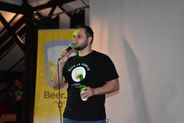So you want to start a developer conference?
The story of WhatTheStack from the PoV of a co-founder. A candid retelling of all things good, bad and ugly - and ultimately, why it's totally worth it.
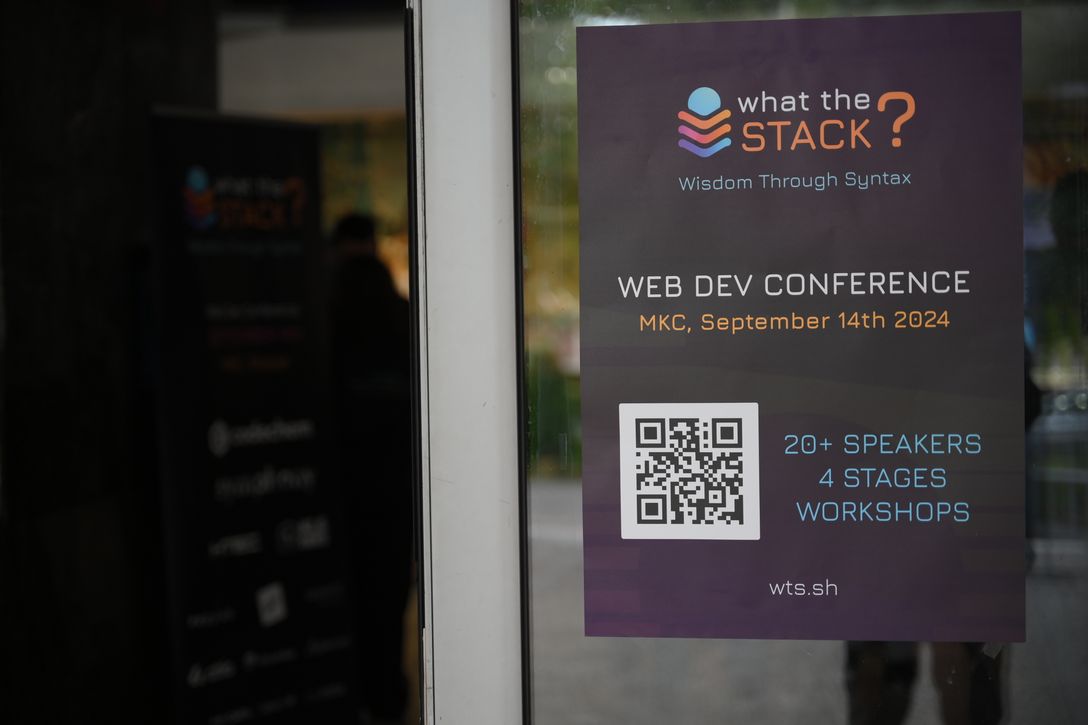
About eight months ago, myself together with a couple of people from my dev education organization, DeveD and a local hackerspace had the call. The first official one, for what was to become WhatTheStack. You know, the kind where crazy ideas are born? Well, this one can be described as: it’s about time we had a dev-focused conference in our corner of the world. Not that there weren’t any, mind you - we wanted something bigger. Something that would be up to par with the conferences we frequent during the year. Thus, the idea of WhatTheStack was born.
It’s funny how things work out sometimes. This particular meeting and idea for a conference was built on the “bones” of another, previous conference. But let’s start at the beginning, shall we?
Iteration 0: A UI/UX Conference That Never Was
Sometime in late ‘23 (I think it was November), team DeveD had a call with a local branch of a very famous international tech education/inclusion org. They were already running a UI/UX meetup, aiming for it to become something bigger - ideally a conference. We’ve collaborated with them on a bunch of projects before and had a pretty good experience overall, so we thought - why not? We weren’t into UI/UX that much ourselves, but we’ve done plenty of tech events before.
We had a pretty good start - we had a venue booked for March (which we realized was way too ambitious, so we moved it to September), a cool logo designed, a website ready, and a ton of ideas for a marketing campaign. But, due to some very legitimate reasons (life happened), we had to call it off. This happened sometime in late January, if I remember correctly. But… team DeveD still had the enthusiasm. Plus, we had the date booked. 🤔
The Birth of WhatTheStack
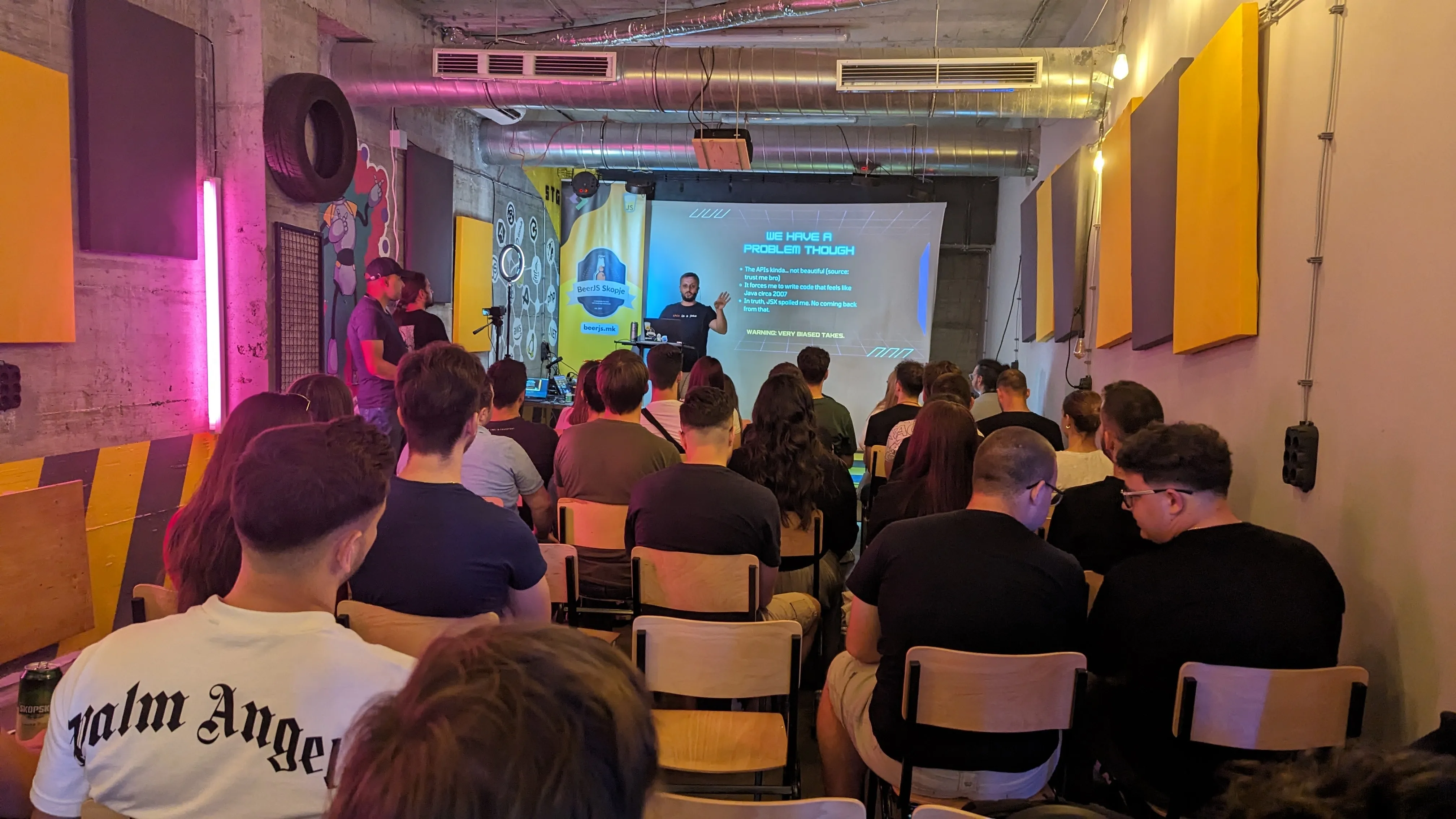
A month later, sometime in February, I had a chat with Pavlina (the community manager at Base42) in which I mentioned in passing that DeveD is doing a developer conference, come rain or come shine. Ideally though, it’s not going to be just us - what I had in mind was a community-driven event, in which any local developer community is welcome to take part in any capacity they see fit. She was quickly on board with the idea - plus it made sense; Base42 is basically the tech community hotspot in my city. The easiest way to get everyone to collaborate on such a grand idea was to get them in the hackerspace and get them talking to each other.
After a few sitdowns, the only local tech community that decided to join our crazy project was Angular Macedonia. I’m using “crazy” because at this point we had just an idea and quite literally zero commercial support (i.e., money). But, such minor inconveniences haven’t stopped us before 😅
Takeaway 1: This is a team sport. Any event org, in fact. Get a team. Involve people who share your interests from your local communities.
At this point in time we had a team and a concept of a plan 😏 And of course, a vibe, since conferences are all about vibes. Thematically, we decided to go for a retrofuturistic and synthwave aesthetic - which plays really well with the brutalist shtick our venue had. But, as we already know, naming is one of the hardest problems in computing. Strictly speaking, our particular problem isn’t in the space of computing, but we needed a domain name that makes sense with the aesthetic we were going for and one that is memorable. After a lengthy brainstorming session sometime in April (which may or may not have involved copious amounts of beer), we came up with WhatTheStack or WTS. The domains we wanted were available, so we were off to the races.
The Next 4 Months: A Blur
The next four months were… well, kind of a blur. I’ll share some highlights without the time context, mostly because I have no accurate idea of when things took place. It was a whirlwind of activity, creativity, and occasional panic.
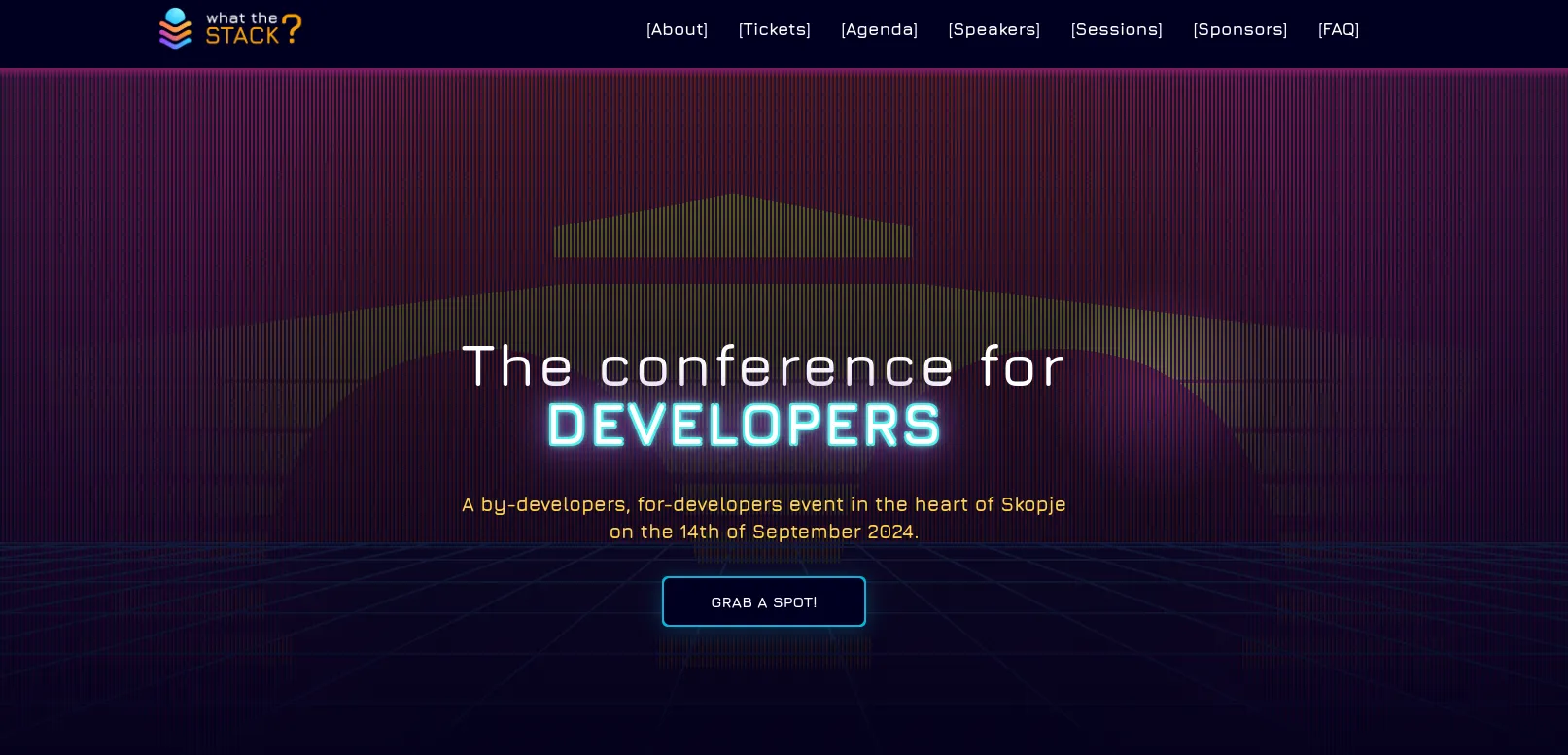
Speakers: From Local Heroes to International Stars
Finding speakers was both exciting and nerve-wracking. We reached out to our networks, slid into DMs, and even cold-emailed a few people we admired. We didn’t get responses from everyone we tried reaching out to, but overall the response was incredible. We ended up with a mix of local talent and international speakers that honestly blew us away.
And now, a round of thank-yous to everyone who helped us out with finding speakers:
- Dave Di Biase - for helping us connect with some amazing speakers from the Solid ecosystem
- Kiril Zafirov - for hooking us up with some pretty big names from the Angular community (in addition to being a part of the org)
- Some of our speakers (most notably Kevin and Mikhail) gave us speaker suggestions which helped us along a lot. We’re inviting some of those next year, so stay tuned 😉
And I’d like to round this up by thanking everyone who applied to speak at WhatTheStack. Some of you didn’t make the cut - we simple had a lot more applicants than we could accommodate. But we’re keeping your applications on file for next year, so we hope to see you then! The CfP for ‘25 will be announced soon.
Takeaway 2: Don’t be afraid to aim high with your speaker lineup. The worst they can say is no, and you might be surprised by how many say yes!
Sponsorships: The Money Dance

Oh boy, this was fun (and by fun, I mean occasionally terrifying). We started with literally zero budget, remember? But we had a vision, and apparently, that vision was contagious. We put together sponsorship packages, practiced our pitch, and started knocking on doors (virtually, of course).
It wasn’t easy. We heard a lot of “no”s and even more “maybe later”s. But we also got some yeses, and each one felt like winning the lottery. Local tech companies, some international firms with offices nearby, and even a few product companies jumped on board.
Takeaway 3: Persistence pays off. And having a clear vision of what you’re offering sponsors (beyond just logo placement) makes a huge difference. That said, I’m not going to lie - it’s a lot of haggling, work, negotiation, and generally not easy to do. But it’s necessary.
Venue and Tech: Making It Work
Remember that brutalist venue I mentioned? Well, even though the vibes were just right, we had a lot of work to do to make it work. We had stages available, but that was about it. We did have enough common sense left to hire a professional lighting and audio company to set up everything related to media tech. And while that wasn’t without hiccups, it made a huge difference.
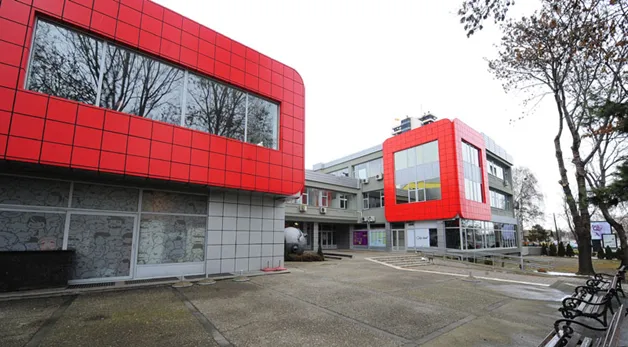
The character of the venue, combined with the professional setup, gave the whole event a unique vibe that you just don’t get in a standard conference center. It’s all about the vibes.
Takeaway 4: Hire professionals, for stuff that’s not your core competency. They’ll make your life easier. By easier, I mean actually being able to run the event.
The Team: What makes or breaks an event
I can’t stress this enough - our team was everything. From the core organizers who lost sleep over every detail to the volunteers who showed up on the day with endless enthusiasm, everyone poured their heart into this.
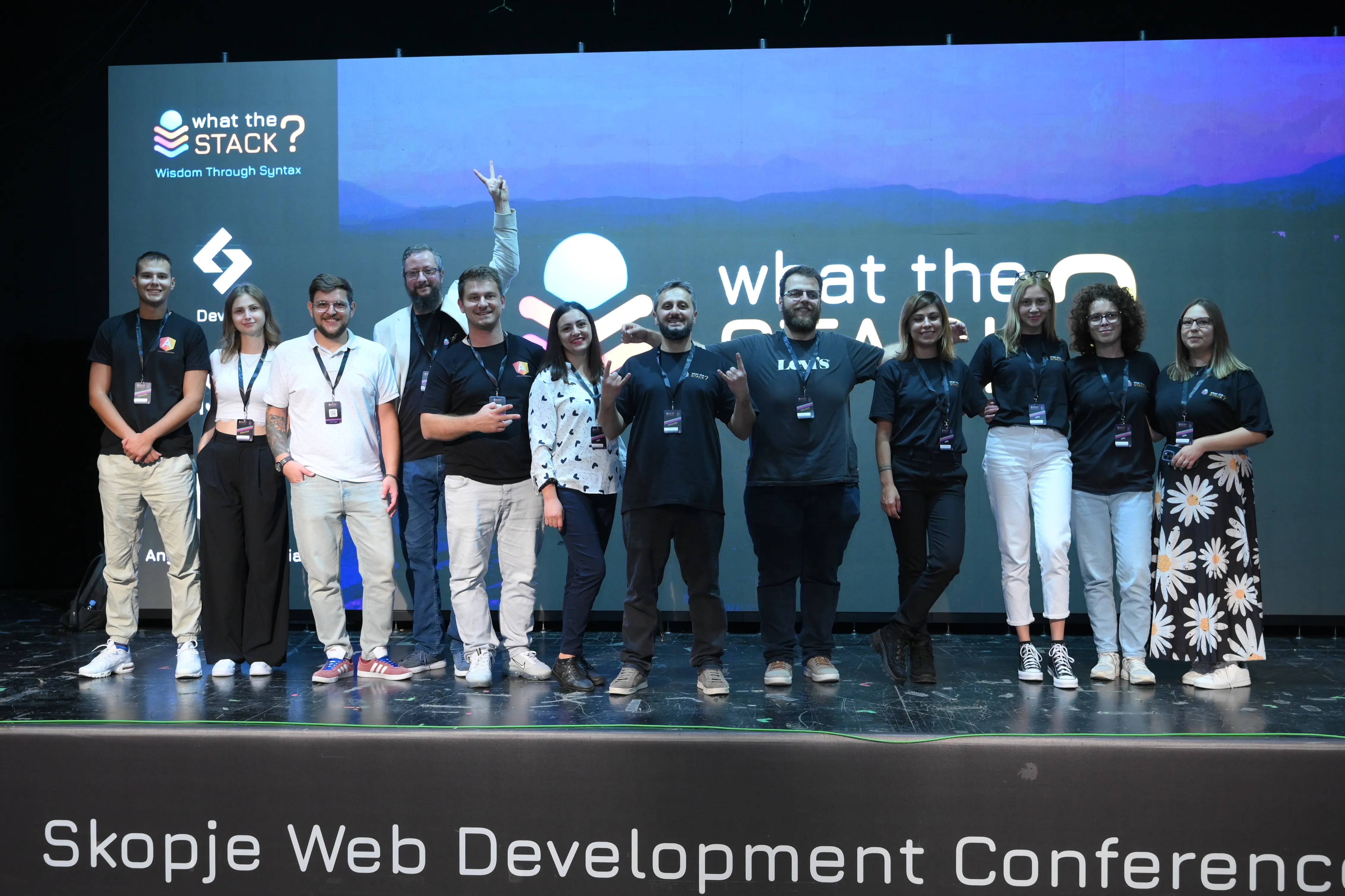
We had people handling speaker logistics, others focusing on attendee experience, and a dedicated crew making sure our tech setup didn’t implode. It was chaotic at times, sure, but seeing everyone come together for this shared vision was… well, it was pretty damn special.
I’ve said it before, but I feel like I can’t say it enough - thanks team. You’re the best ❤️
Takeaway 5: Events are hard work, but a good team makes all the difference.
The Week Before: Controlled Chaos
The final week before the conference was a mix of excitement, panic, and last-minute problem-solving. We were finalizing schedules, doing tech checks, and ensuring everything was in place for the big day. The fact we had a whole week of workshops didn’t help either (yours truly is to blame for that aMaZiNG idea). We had some great workshops however, and most of them were a success. So, I’d say it was worth it, in the end, even though we were running on fumes.
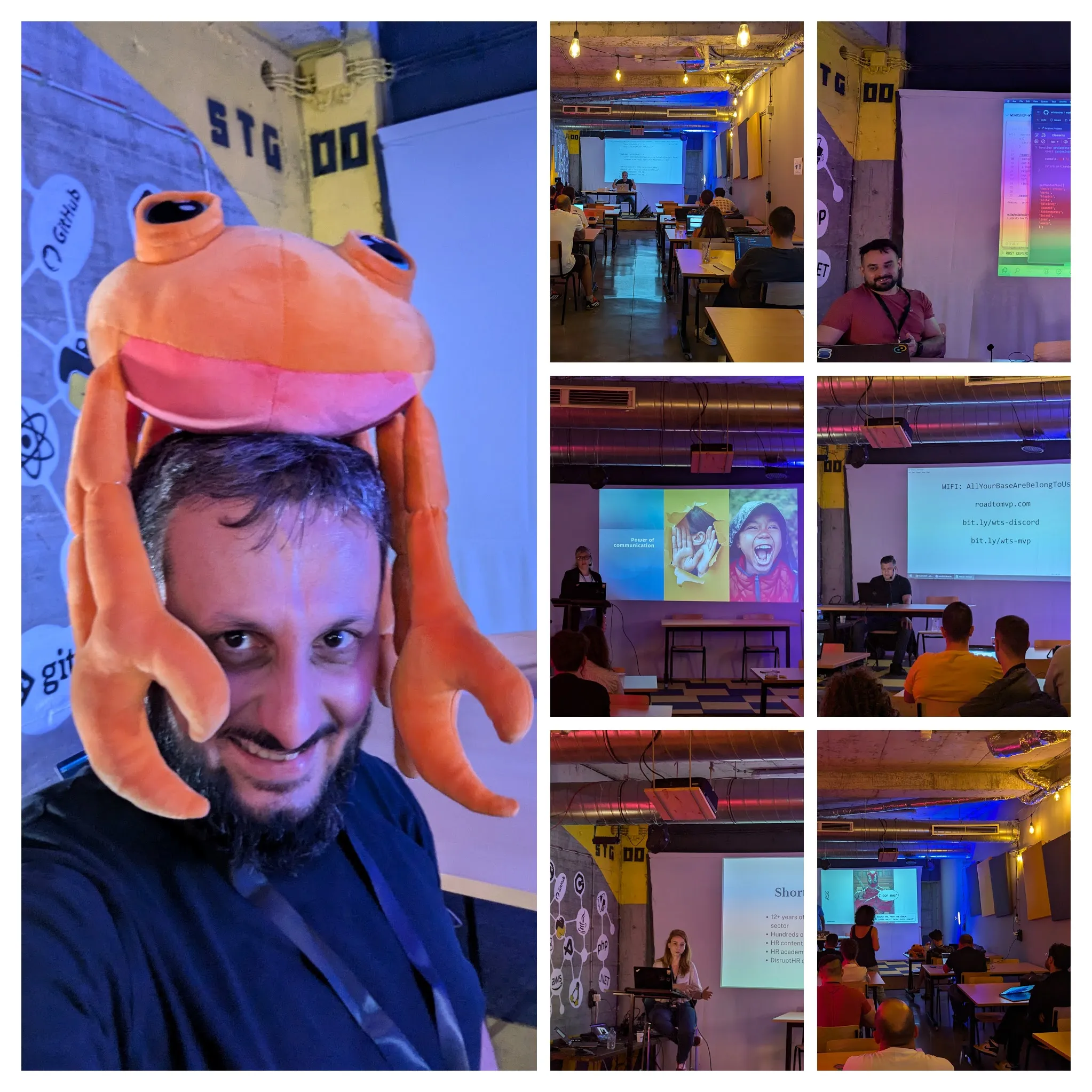
There were moments when it felt like everything might fall apart. Despite the usual pre-event jitters, we didn’t encounter any major setbacks like speaker cancellations. Our preparations paid off, and we were ready for the big day.
We also had a couple of informal meetups with the speakers which were truly fun and helped us take a step back and enjoy the moment.
Takeaway 6: No plan survives first contact with the “enemy”. Still, planning is key.
The First-Ever WhatTheStack: We Did It!
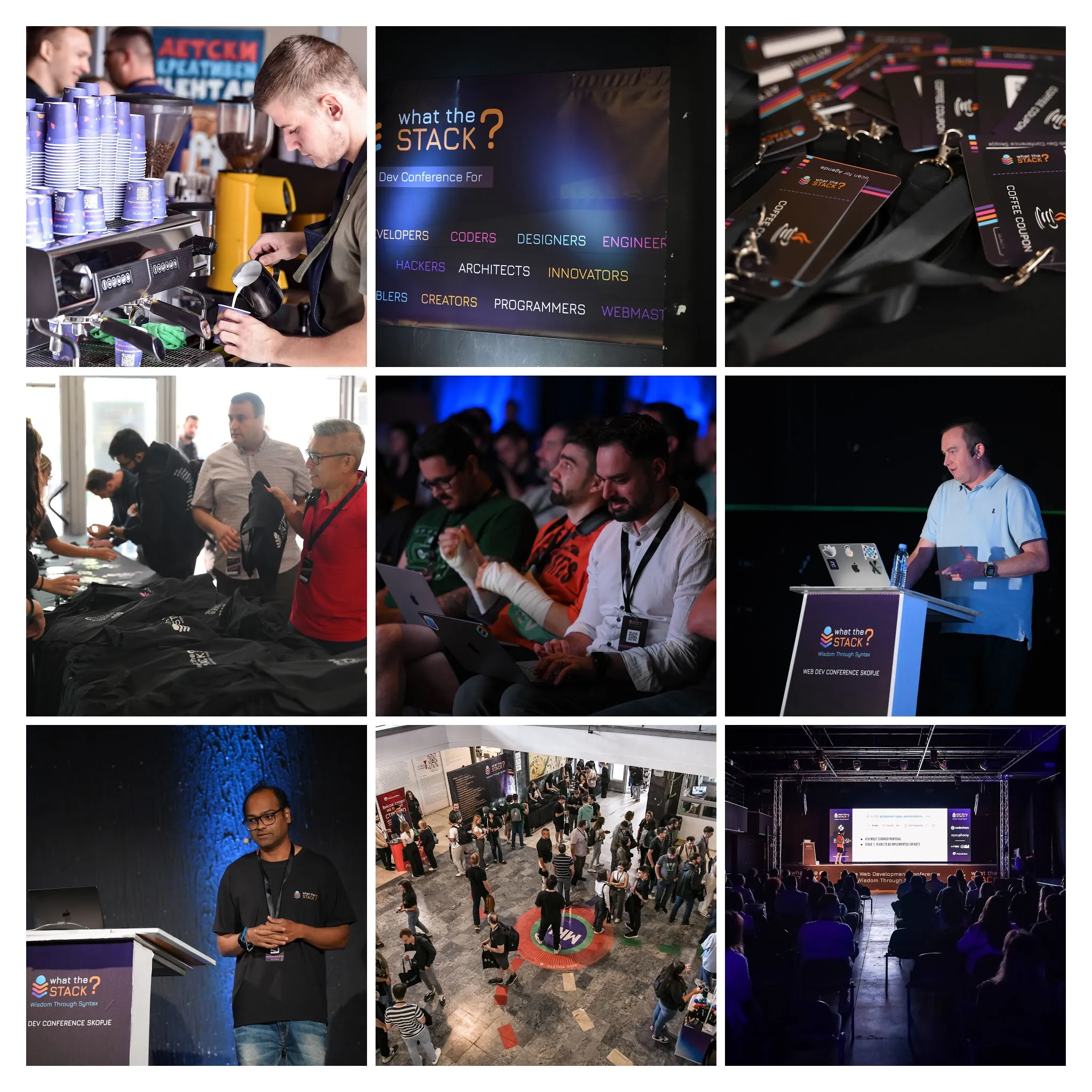
And then, suddenly, it was happening. People were arriving, the talks were starting, and the energy… wow. It was electric.
Seeing attendees engaged in deep conversations between sessions, watching speakers nail their presentations (even with our occasionally temperamental AV setup), and feeling the buzz of excitement throughout the venue - it was all worth it.
The Good
Surprisingly, we were accurately on schedule - something that doesn’t happen too often. The feedback from attendees and speakers alike was overwhelmingly positive. People loved the mix of local and international perspectives, the casual vibe that encouraged real conversations, and yes, even our quirky venue. Overall, it was a success.
The Bad
We had our hiccups, sure. We didn’t have WiFi in the venue, so we had to hotspot it in production. The VIP area kinda sucked (largely out of our control, and something we plan on fixing next year). One of our projectors decided it wasn’t feeling it for the day, and kinda worked half-heartedly. We had some issues with long lines for the coffee and food trucks - but I’ve grown to expect that at any event, really. And to be honest, I’m not exactly sure how to fix that. I’m open to suggestions 😄
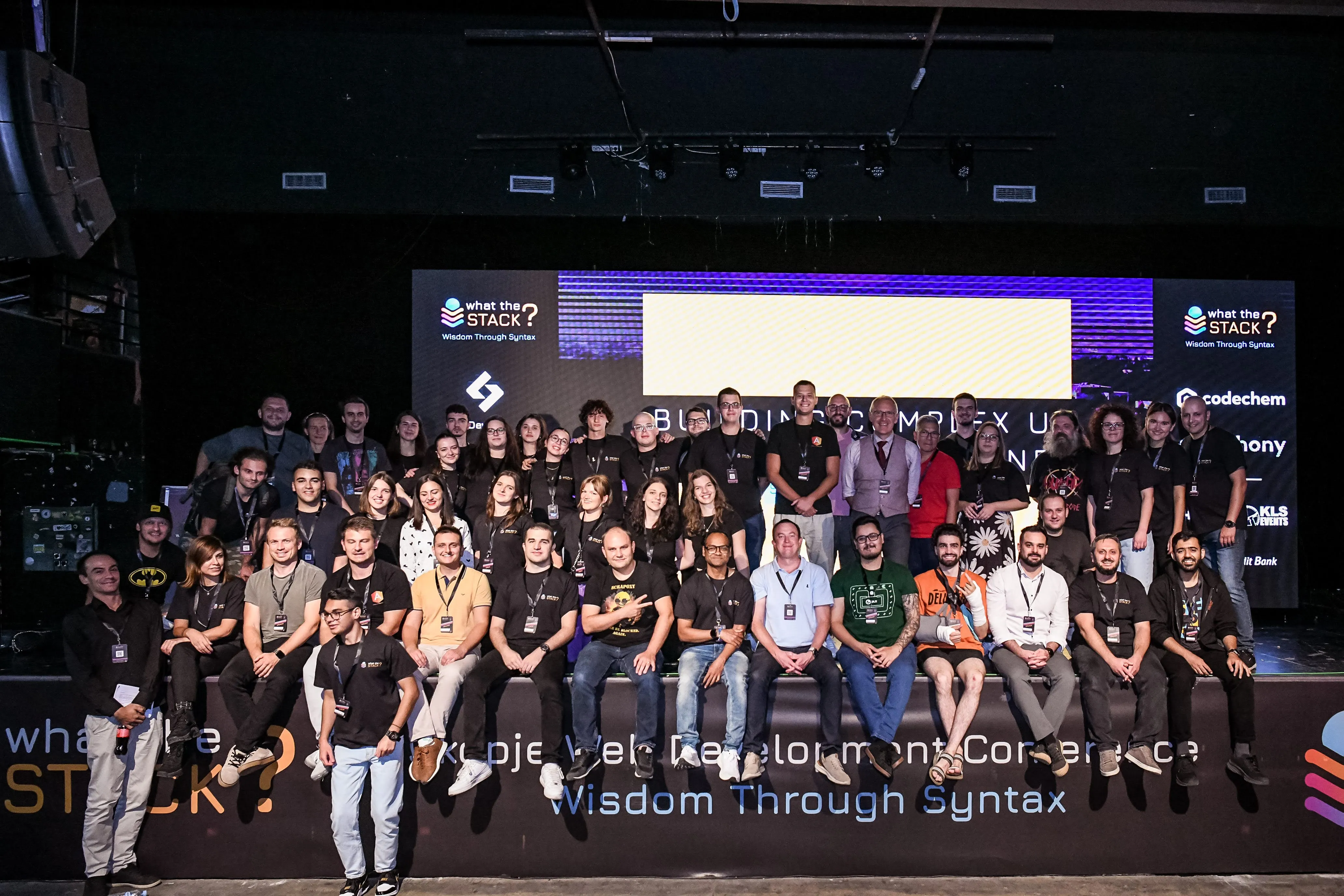
The Afterglow and Looking Forward
As I write this, a couple of months after the event, I’m still feeling the high of pulling it off. The last messages in our speakers’ group chat are full of warmth, new friendships formed, and excitement for “next year” - words that simultaneously thrill and terrify me.
We’ve already started gathering feedback, making notes on what worked well and what we can improve. Because yes, there will be a next year. This crazy idea has taken on a life of its own, and we’re here for it.
To everyone who spoke, attended, sponsored, or helped in any way - thank you. You took a chance on a brand-new conference, and you made it something special.
Final Takeaway: Building a conference from scratch is hard work, but the community you create and the connections you build make it all worthwhile. If you’re thinking about starting your own event, my advice is simple: go for it. It’ll be chaotic, stressful, and at times overwhelming. But it’ll also be one of the most rewarding things you’ll ever do.
See you at WhatTheStack 2025! 🚀
Extra credit: From a different angle
I remember listening to this episode of the Changelog, on my way to WeAreDevelopers World Congress. They had Shawn “swyx” Wang on the show, discussing how DevRel is changing. He had some interesting things to say about conferences and the future of the DevRel landscape, but the one thing that stuck with me was:
… And any Dev Rel who believes their own BS enough should actually go out on their own and do this as an independent business venture, because it is worth much more to dozens and maybe hundreds of companies than it is to a single company.
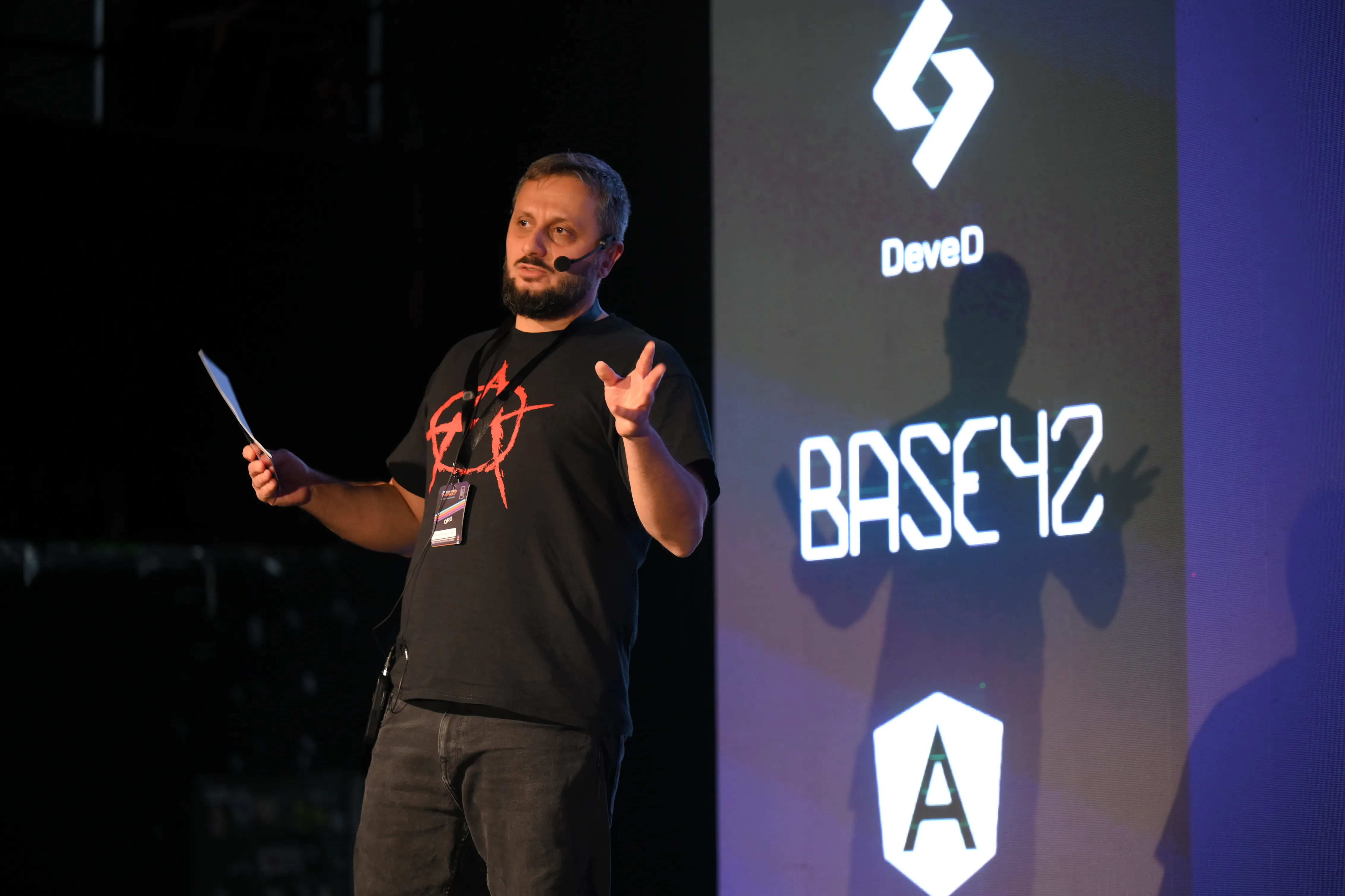
The context was around speaking and organizing conferences, and I feel like this hits home. If you’re convinced in the value of what you’re doing, you should probably go out on your own and do this as an independent business (or community-driven) venture. It’s worth much more to dozens and maybe hundreds of companies than it is to a single company. It’s not an either/or with having a job, in DevRel or otherwise.
WhatTheStack validated my BS for me, to riff on swyx’s words. This is not just about the money (we’re not getting rich off WTS). It’s about much more than that - for me it’s about the connections, the community, the opportunity to learn and grow, and the chance to make a real difference in the tech landscape.

